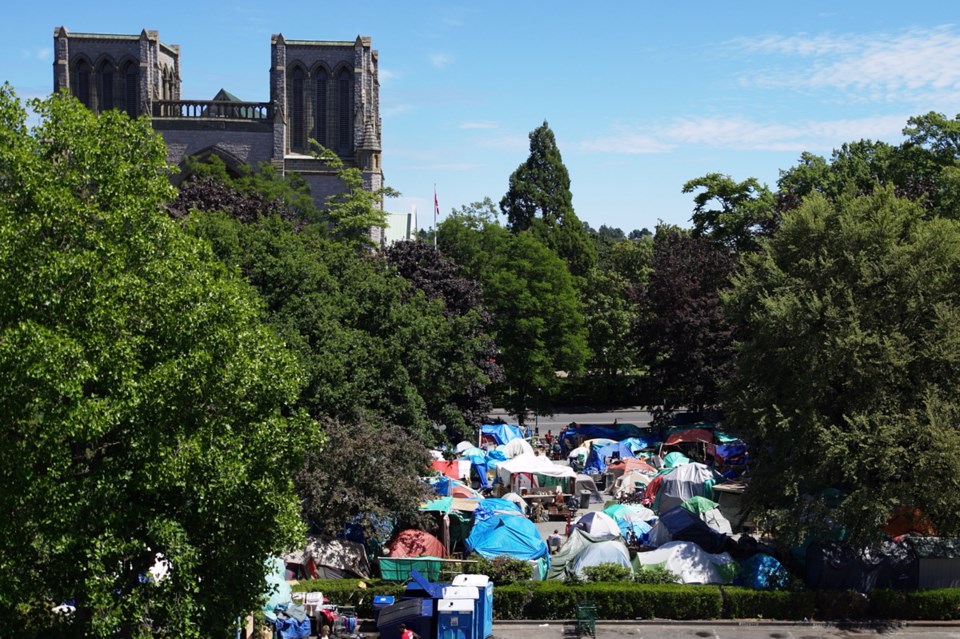The B.C. government plans to purchase two more buildings in Victoria to house homeless people and bolster its case to shut down a tent city behind the courthouse, Housing Minister Rich Coleman said on Friday.
Coleman declined to identify the buildings until the sales have closed, but said they would provide more than 140 units — enough to house all the remaining residents at the camp.
“I can tell you that whoever’s living down there today that is legitimately homeless can have a home because we have the inventory,” he said.
Coleman made the comments as the government filed 69 affidavits in support of a court application to evict the tent city residents. He said the promise of additional housing combined with worsening fire risks and increased criminal activity at the camp have strengthened arguments for an injunction.
“It is now time, in my opinion, that, hopefully, we will get what we need from the courts and be able to move this file forward and clear this site,” he said.
B.C. Supreme Court Justice Christopher Hinkson rejected an earlier application for an interim injunction in April.
He concluded that there was no place for the residents to move and that the problems would simply migrate elsewhere in the city.
Hinkson will hear the new application June 27 and 28.
“This time, I think we have a much stronger case because of the information we’ve had to compile,” Coleman said. “Unfortunately, in order to get there, to where we think the injunction is stronger, the site had to get worse not better.”
The government’s application states that many of the original campers at the site have left and were replaced by “a more predatory criminal element, including a group comprised of young males in their early to mid-20s with apparent gang associations. The police have observed an increase in crime on and around the site, including drug trafficking and violence.”
The application notes that neighbours of the encampment report deteriorating conditions around the camp, including thefts, garbage, graffiti, vandalism, rats, needles, human feces and public urination. The government said the provincial director of child welfare is concerned for the safety of young people on the site, noting that “two are known to be there and as many as 10 may be frequenting it.”
Stephen Portman of the Together Against Poverty Society, which has advocated for tent city residents, welcomed Coleman’s promise of more housing. “Any time I hear a substantial investment in social housing in this community, that’s good news,” he said.
But he called it “perplexing” that the government would pursue an injunction to evict homeless people before that housing is available and prior to neighbours being consulted. He said it’s unlikely the government could get the buildings up and running before the court hearing.
“To go to court and say: ‘Well, judge, we’d like you to evict these people to the street, but don’t worry, we’ll have housing eventually,’ doesn’t seem like a very strategic path,” he said.
Cool Aid Society’s Kathy Stinson said the government has not approached it about operating additional shelters or buildings, but she hopes they do. The housing organization operates Mount Edwards Court, the Vancouver Street building bought by the province to house tent city residents.
“We don’t have any space or any support dollars so they would have to provide, that as well,” Stinson said, noting that tent city residents who leave now would face difficulties finding spaces in the city’s shelters.
“We are absolutely at capacity,” she said. “I hope the community is able to stay calm over the next month. This [transition] won’t happen overnight.”
Tent city resident Ana McBee is on the safety committee at the camp. She said they’re working to comply with all the fire safety concerns and will continue to do so. “We are putting in a lot of work every day with no funding or help,” said McBee. “They are asking more from us than we are able to complete in a short time, but we are bustling to try.”
She said keeping the camp in order and the demands of being homeless — such as finding food — are a daily challenge.
Tent city residents have requested meetings with the province to discuss what kind of housing could best work for them. They are also in the midst of a survey to provide information on their population and immediate needs.
McBee said the province should have waited for this information and consulted with tent city residents before making plans to dismantle the camp and attempt to relocate those involved.
Coleman announced a week ago that the province would head back to court based on a recent fire inspection of the camp.
The Office of the Fire Commissioner said last week that the camp was out of compliance with fire safety orders issued in February and May.
“The danger to life safety created by the fire hazards is increasing and is considered to be only a matter of time before a serious fire incident occurs,” the inspection report said.
The province said that it has invested $5 million since October to add 190 units of transitional housing and shelter space for people at the homeless camp.
The government said 22 people have transitioned into permanent housing.



